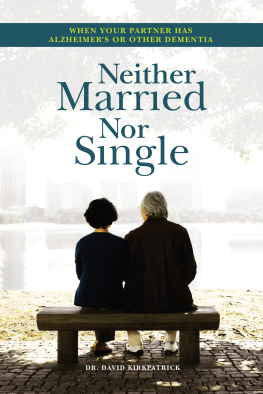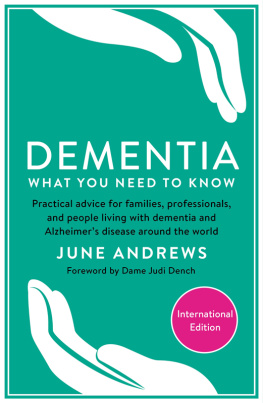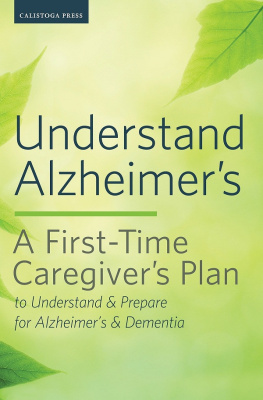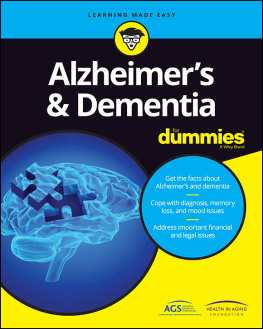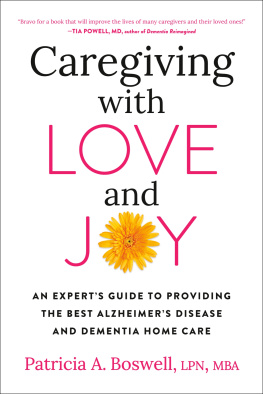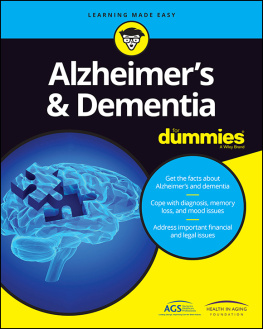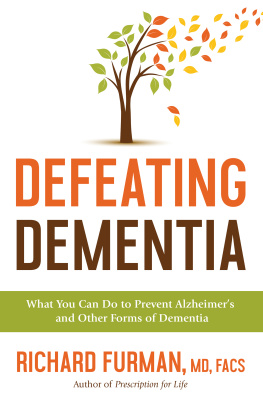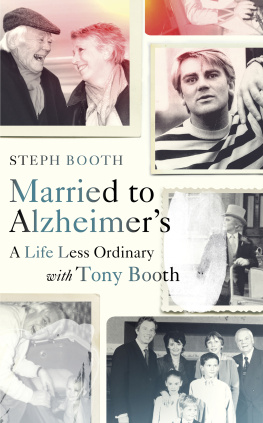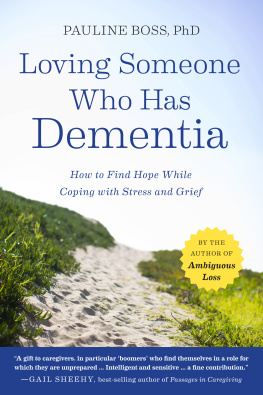The cover page shows a photo of an older couple sitting beside each other on a bench as seen from behind. They seem to be in a park with a lake and trees, but only the area near the couple shows faint hints of colour. Most of the background is in a faded sepia tone.
Neither Married nor Single
When Your Partner Has Alzheimers or Other Dementia
David Kirkpatrick, MA, MD

Copyright 2018 David Kirkpatrick
18 19 20 21 22 5 4 3 2 1
Printed and manufactured in Canada
Thank you for buying this book and for not copying, scanning, or distributing any part of it without permission. By respecting the spirit as well as the letter of copyright, you support authors and publishers, allowing them to continue to create and distribute the books you value.
Excerpts from this publication may be reproduced under licence from Access Copyright, or with the express written permission of Brush Education Inc., or under licence from a collective management organization in your territory. All rights are otherwise reserved, and no part of this publication may be reproduced, stored in a retrieval system, or transmitted in any form or by any means, electronic, mechanical, photocopying, digital copying, scanning, recording, or otherwise, except as specifically authorized.
Brush Education Inc.
www.brusheducation.ca
contact@brusheducation.ca
Copy editing: Leslie Vermeer
Cover and interior design: Carol Dragich, Dragich Design; Cover image: istock: stevecoleimages
Excerpts from Re-Inventing a Life by Michael Smith reproduced by permission of the author.
: David and Clair, 2008; photographed by joy Fai.
Library and Archives Canada Cataloguing in Publication
Kirkpatrick, David, 1939-, author
Neither married nor single: when your partner has Alzheimer's or other dementia / Dr. David Kirkpatrick.
Includes bibliographical references.
Issued in print and electronic formats.
ISBN 978-1-55059-728-8 (softcover).--ISBN 978-1-55059-729-5 (PDF).--ISBN 978-1-55059-730-1 (Kindle).--ISBN 978-1-55059-731-8 (EPUB)
1. Kirkpatrick, David, 1939- --Marriage. 2. Alzheimer's disease--Patients--Care. 3. Alzheimer's disease--Patients--Family relationships. 4. Caregivers. I. Title.
RC523.2.F58 2018 362.1968'31 C2017-906795-8
C2017-906796-6

To Clair Ladner Hawes.
You made a difference.
Preface
There was a time when I laboured under the misconception that Alzheimers disease and other dementias were tragedies that happened to other people, older people. After all, as a psychologist, a psychiatrist with three years experience in geriatric psychiatry andmost central to my professional identitya psychotherapist for more than thirty years, I had been counselling the victims of dementia in its many guises, as well as the caregivers whose lives had been completely disrupted by it.
Then in 2007 my wife, Clair, a gifted clinical psychologist, was diagnosed with early-onset Alzheimers disease. As her life changed and deteriorated, my life changed, too. But I found myself experiencing her tragedy as a sort of outsider-insider. On the one hand I was a curious, detached clinician; on the other, I was a heartbroken, grieving partner looking for help like any other caregiver of a partner struggling with this intruder.
I soon learned that almost all the literature on Alzheimers is written for people caring for parents or grandparents with the disease, not for partners and caregivers within an Alzheimers marriage. Yes, there are great books of fiction and movies exploring the married perspective, but I was looking for a true story told from both a personal and a professional point of view. As Clairs disease progressed, I documented her story in my daily journals. One day I began to write that story down formallyfor myself, at first, and then for a wider audience as I realized how many other women and men in Alzheimers marriages were seeking help.
From about 2010 to 2014 I belonged to a support group for Alzheimers and other dementias. Several friends from this group, along with a few others, responded warmly to my request for discussions and informal recall of their experiences with their loved ones with dementia. We talked, listened and shared in confidence, so their real names do not appear in this book.
With this encouragement, I began exploring and writing about some of the topics that caregiving partnersand even dementia support groups!generally tiptoe around in order to avoid offending families and friends: When is the right time to find or even begin considering a care home for your loved one? What is a normal sex life with an Alzheimers partner? When is it appropriate to consider re-socializing with a new partner? Can I/may I love two people at once without incurring the righteous anger, resentment or frustration of friends or familyor, heaven forbid, both?
And so my manuscript gradually evolved into a how-to for the caregiving partners of dementia sufferers, a book that offers a hand to those of you who live within an Alzheimers (or other dementia) partnership. It is not written to make you feel happier or to cheer you up, but to help you nurture, develop and experience the real you. And as you read on, I hope you will find yourself moving far beyond the emptiness of grief that dementia has brought into your life.
You are not alone.
Acknowledgements
Thank you
To Betty Keller and Leslie Vermeer, whose combined sense of editorial clarity stopped short of sentimentality and made this book the best it could possibly be.
To my gifted home office manager, joy Fai, who truly made a difference before and after Clairs diagnosis and kept our respective offices humming without fail.
To my children and step-children, Andy, Christy, Mindy and Stefan, who supported Clair, me and both of us without ever complaining.
To therapists Molly and Grant. To Dr. Jeff Beckman.
To friends and family, Jay and Florina. Sara and Shmuel. Susan and Maggie. Stephy and Dan. And Edie, Susan and Doug.
To all the staff at Kiwanis Care Centre, who looked after Clair for six years with devotion, warmth and professionalism.
And to Clairs patients and clients, who never forgot her but remember her with sharp gratitude and appreciation.
To the members of our dementia support groups and those who volunteered their time to talk with me of their experiences.
To the millions of individuals in this world struggling with Alzheimers and other forms of dementia today.
And to their family, friends, caregivers and communities who continue their nurturance of these individuals with love, courage, commitment and persistence.
Chapter One
Chapter One The Diagnosis
It was March 2007 and my wife Clair and I had endured what seemed like an excruciating, unnecessarily long period of diagnostic frustration, awaiting some answersany answersto what was plaguing her. Brief lapses in memory. Losing her keysbut shoot, Id done that myself more than once. Misinterpreting others actions and reactions. Mild disorganization such as leaving bedroom and bathroom lights onI did that, tooand trying to bake a pizza in the microwave. But all of this was way out of character for the highly organized woman I had known and loved for more than twelve years.

